Natural Herb Medicine
Smoking is one of the most addictive habits worldwide, with serious consequences for both the smoker's physical and mental health. When a person quits smoking, they are likely to face a variety of challenges: from withdrawal symptoms to weight gain, cravings, and even anxiety. While nicotine addiction is a significant hurdle, the process of healing and recovery also requires support for the body and mind. This is where natural herbal medicine can play a crucial role in aiding ex-smokers.
In this post, we'll dive into the benefits of natural herbs and how they can support those on their journey to quitting smoking, focusing on physical recovery, mental well-being, and overall health.
1. Understanding Herbal Medicine: What It Is and Why It Works
Herbal medicine has been practiced for thousands of years, with ancient civilizations relying on plants and herbs to treat a wide range of ailments. Today, the popularity of herbal remedies is experiencing a resurgence, especially as people become more interested in natural ways to heal and maintain their health.
Herbal medicine works by using the active compounds found in plants to treat specific conditions or boost overall health. Many herbs contain powerful antioxidants, anti-inflammatory agents, and compounds that can promote healing, balance, and wellness. Unlike pharmaceutical drugs, herbal remedies tend to have fewer side effects and work more gradually, making them a safer option for long-term health support.
For ex-smokers, the transition from nicotine dependence to a smoke-free life can be challenging. Herbal medicine can help by addressing the body's healing needs, supporting mental clarity, and managing withdrawal symptoms.
2. Herbs for Physical Recovery After Smoking
When someone quits smoking, their body immediately begins to heal, but the process is gradual. The lungs, heart, liver, and other organs need time to recover from the damage caused by smoking. Here are a few herbs that can help support this process and accelerate physical recovery:
Mullein is a powerful herb known for its ability to support lung health. It can help clear mucus from the lungs and soothe inflammation, which is particularly beneficial for ex-smokers who may suffer from respiratory issues like coughing, wheezing, or shortness of breath. Mullein also helps reduce irritation in the respiratory system, making it easier for ex-smokers to breathe deeply and comfortably.
Lobelia is often referred to as "Indian tobacco" because of its historical use in treating nicotine addiction. It has a compound called lobeline, which mimics nicotine’s effects on the brain, but without the addictive properties. This herb can be a helpful ally in the early stages of quitting, as it can help reduce cravings and the urge to smoke. Additionally, lobelia is a bronchodilator, which can aid in opening the airways and improving lung function.
Thyme is a powerful herb with antiseptic properties, making it excellent for supporting lung and respiratory health. It can help clear out toxins from the lungs, reduce coughing, and improve overall lung function. After quitting smoking, thyme can support the detoxification process, helping the lungs flush out the harmful substances accumulated from smoking.
Nettle is rich in vitamins and minerals that can help replenish the body’s nutrients after smoking cessation. It has natural anti-inflammatory and detoxifying properties, supporting the liver and kidneys in removing toxins and promoting better circulation. By improving overall detoxification, nettle helps ex-smokers recover from the toxic buildup left by smoking.
3. Herbs for Easing Withdrawal Symptoms
Nicotine withdrawal can cause a range of symptoms, including irritability, fatigue, anxiety, and even depression. Fortunately, several herbs can help manage these withdrawal symptoms and ease the emotional rollercoaster of quitting.
St. John’s Wort is a well-known herb for managing mood and emotional health. It has been used for centuries to treat depression, anxiety, and nervous tension. After quitting smoking, the sudden drop in nicotine levels can cause emotional imbalances, and St. John’s Wort can help alleviate these feelings. By supporting the production of serotonin, a neurotransmitter that regulates mood, St. John’s Wort helps lift the spirits and reduce feelings of irritability and sadness.
B. Ashwagandha (Withania somnifera)
Ashwagandha is an adaptogen, meaning it helps the body adapt to stress. This herb is particularly useful for managing anxiety, stress, and fatigue during the quitting process. By regulating cortisol levels (the stress hormone), ashwagandha helps promote a sense of calm and balance, which is essential when dealing with the emotional rollercoaster of quitting smoking.
Quitting smoking can often disrupt sleep patterns, with many ex-smokers experiencing insomnia or restlessness during the initial stages of withdrawal. Valerian root is a natural sedative and is widely used to promote relaxation and better sleep. By calming the nervous system and reducing anxiety, valerian root can help improve sleep quality, allowing ex-smokers to rest and recharge during the challenging days of nicotine withdrawal.
Passionflower is another herb known for its calming properties. It’s particularly helpful for reducing anxiety, nervousness, and irritability, which are common during the first few weeks after quitting smoking. Passionflower also supports the nervous system, promoting relaxation and helping manage the tension that may arise when nicotine cravings are at their peak.
4. Herbs to Manage Cravings and Prevent Relapse
Nicotine cravings can be intense, and they can lead to relapse if not managed effectively. Luckily, certain herbs can help reduce cravings, curb the urge to smoke, and promote healthier habits.
Green tea is packed with antioxidants and catechins, compounds that support the body’s detoxification process. For ex-smokers, green tea can help with cravings by providing a natural boost of energy, without the addictive properties of caffeine. It also supports healthy blood sugar levels, which can help reduce the temptation to reach for a cigarette when blood sugar levels fluctuate.
Licorice root is a natural remedy for stress and cravings. It has a sweet taste that can help curb the urge to smoke, especially for those who may use cigarettes as a way to satisfy a sweet tooth. Additionally, licorice root supports the adrenal glands, which can become depleted during the stress of nicotine withdrawal. By providing adrenal support, licorice root helps reduce fatigue and cravings.
C. Ginseng (Panax ginseng)
Ginseng is an adaptogen that helps reduce stress and boosts energy levels. When quitting smoking, many individuals experience fatigue, low energy, and stress. Ginseng can help improve overall vitality and mood, making it easier for ex-smokers to stay motivated and focused on their goals. Ginseng also supports mental clarity and cognitive function, helping to reduce the foggy feeling that can occur during the withdrawal process.
5. Herbs for Overall Health and Wellness
After quitting smoking, it's essential to focus on rebuilding the body’s strength and immunity. Several herbs can promote overall health and well-being, ensuring that ex-smokers regain their vitality and resilience.
Echinacea is well-known for its immune-boosting properties. It can help strengthen the immune system, which may be weakened after years of smoking. Echinacea is especially helpful in reducing the risk of infections, colds, or flu, as it supports the body's natural defense mechanisms. After quitting smoking, the body is more vulnerable to respiratory infections, and Echinacea can help prevent these from setting in.
Turmeric contains curcumin, a powerful anti-inflammatory compound that helps reduce inflammation in the body. For ex-smokers, turmeric can aid in the repair of damaged tissues and organs, especially the lungs and cardiovascular system. By promoting anti-inflammatory effects, turmeric helps to speed up the healing process and can contribute to better overall health.
Dandelion root is a natural detoxifier that supports liver function, which is essential after quitting smoking. The liver plays a crucial role in detoxifying harmful substances, and dandelion root helps improve liver health by promoting bile production and supporting detoxification pathways. It also helps regulate digestion, which can be helpful for ex-smokers who may experience digestive issues after quitting.
6. Conclusion: Embracing Herbal Medicine for a Smoke-Free Life
Quitting smoking is a journey, and natural herbal medicine can be a powerful tool to support that journey. By incorporating herbs into your daily routine, you can alleviate the physical and emotional challenges of quitting, speed up your recovery process, and build a stronger, healthier body and mind.
Remember that while herbal remedies can help, they are most effective when combined with a strong support system, a healthy diet, and consistent self-care. Whether you are dealing with cravings, withdrawal symptoms, or the physical toll that smoking has taken on your body, herbal medicine offers a holistic, natural solution to support your recovery.
As you continue your journey toward a smoke-free life, consider exploring different herbs and finding what works best for your body. By embracing the healing power of nature, you can reclaim your health and live a vibrant, smoke-free life.

